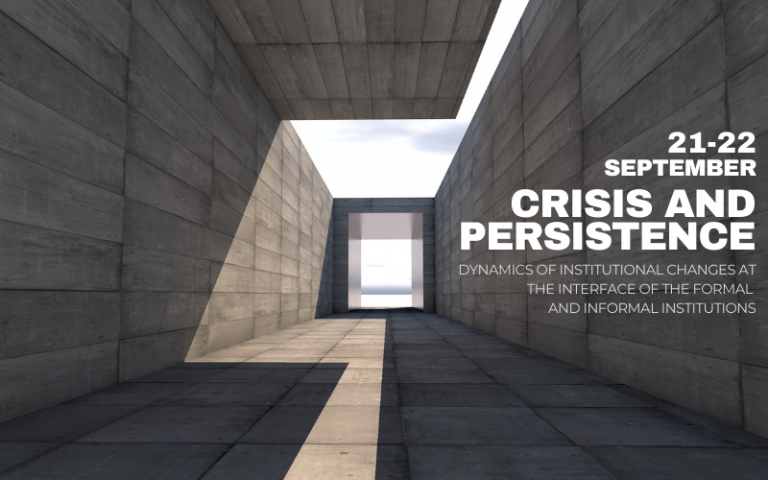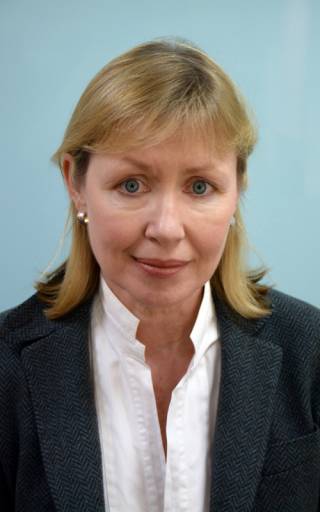Crisis and Persistence
21 September 2021–22 September 2021, 9:30 am–1:00 pm

An annual London workshop on institutional studies organised by The Friday Association for Institutional Studies
This event is free.
Event Information
Open to
- All
Availability
- Yes
Cost
- Free
Organiser
-
SSEES
Watch the recording of the Keynote Address - Prof Alena Ledeneva
As the COVID sanitary emergency continues to unfold, and despite the glimmer of hope afforded by the vaccine roll-out in some parts of the world, we are reminded of the key role crises often play in institutional change. Indeed, they constitute opportunity windows for change and sometimes moments of critical junctures and structural breaks in the development of economic institutions (Collier and Collier 1991; Acemoglu and Robinson 2012). However, some – even major – emergencies do not seem to have the expected disruptive effect on institutional arrangements, with institutional features showing remarkable resilience in the face of major upheaval (Crouch 2011). One stream of scholarship focuses on “punctured equilibrium” models (Baumgartner and Jones 1993), “grammar of institutions” (Crawford and Ostrom 1995) or “critical junctures” (Acemoglu and Robinson, 2012), that is to say on events or conditions generating big and radical institutional changes. Another stream of research has pointed out the importance of more subtle processes of institutional change, proposing theoretical tools that capture incremental, but still transformative processes of change (Mahoney and Thelen 2010; Streeck and Thelen 2005).
Against this general backdrop, one important understudied aspect is the role of informal institutions and their interplay with formal institutions in processes of institutional change. Crises are often associated with disruption of the formal institutional order, while little attention is paid to the role of informal institutions. Informal institutions are sometimes seen as ‘second best’ (Rodrik 2008) compared to more formal institutional arrangement. However, in crisis situations when the formal institutional order breaks down or is severely challenged, informal institutions may prove crucial for economic activity to persist by providing resilience. Conversely, whether or not a crisis will provide an opportunity for formal institutional change may also depend on whether informal institutions supporting the status quo remain unchallenged or are equally shaken by the crisis. More generally, informal institutions have been conceptualised as shaping the implementation of formal institutions, making them a more fundamental driver of institutional change (Boettke, et al., 2008).
Overall, we thus contend that crises provide opportunities to further our understanding of the interplay between formal and informal institutions. Better understanding the interplay between formal and informal institutions in times of crises holds important lessons for both theory and policy making. In certain circumstances, socially desirable change does not happen although recurring crises may show the limitations of the existing system. Conversely, more research is needed on what makes institutions resilient to crises even when change appears desirable. Both issues require a better understanding of the interplay between formal and informal institutions.
Keynote address:
Social sciences are divided over conceptual and methodological tools to tackle informality. UCL call for a cross-discipline and cross-area studies enquiry into the complexity of informality has resulted in The Global Encyclopaedia of Informality: Towards Understanding of Social and Cultural Complexity Volumes 1 and 2 (UCL Press, 2018) and an online database (in-formality.com). This combined effort of over 250 researchers across the globe in the Global Informality Project has resulted in an important shift in studying informal institutions, networks, practices, norms and behaviours. This network-based expertise has enabled us to experiment with the method of context-sensitive comparison and resulted in some novel findings about the nature of informality. At least four forms of ambivalence – substantive, normative, functional and motivational – underpin the modes and varieties of formal/informal interactions. Understanding complexity through the lens of ambivalence has provided qualitative insights into the informal workings of human societies, as well as identified new challenges for quantitative approaches. Measuring ambivalence found in the bottom-up problem-solving practices could lead to a paradigm shift in policy-making.
Programme overview
Tuesday 21 September
| 9.45-10.00 | Introduction |
| 10.00-12.00 | First paper session: Institutional resilience under pressure, frictions and uncertainties |
Wednesday 22 September
| 9.30-11.30 | Second paper session: Institutional change in times of crisis |
| 12.00-13.00 | Keynote Informal Institutions: Paradigm Shifts and Matters of Ambivalence - Prof Alena Ledeneva, UCL SSEES |
 Close
Close


